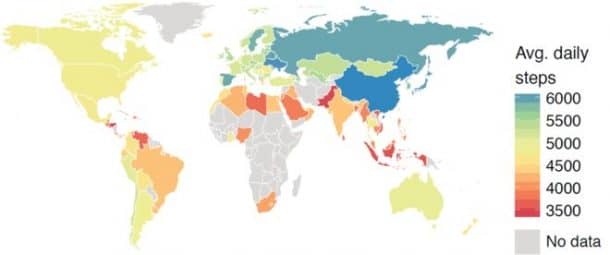

Argus app by Azumio Inc reports the laziest country of the world


Rajat Taheem
June 24, 2020
As per US scientists study of anonymous accelerometer data from 700,000 people’s smartphones who used the Argus activity monitoring app, a list has been prepared citing the most laziest countries across the world.
The Stanford University researchers went through an analysis to come up with a global daily steps average of 4,961. Considering that, Hong Kong topped the average with 6,880 steps a day, while Indonesia stood last with just 3,513 steps.
This is by far the most revealing data than any other relevant survey done in the past. This study gives important insights on improving people’s health and facts on obesity.
Argus provides a general idea of how active you are each day, offering features one might not find on other fitness trackers. It Integrates with both IOS & Android! The extra features includes the ability to collect information like your heartbeat or weight from other sources that makes for a well-rounded experience for a fitness tracker.
The main user interface of Argus consists of data laid out with hexagons in a honeycomb-like pattern. Each hexagon holds a data point, such as current weight, step count, sleep pattern, or calorie count.
Considering the fact that the average number of steps for a country directly associates with obesity levels, countries were categorized as laziest amongst the list. Country with the lowest average number of steps recorded highest obesity based on the various fitness tracking devices.
As per Tim Althoff, one of the researchers, Sweden had one of the smallest gaps between activity rich and activity poor and it also had one of the lowest rates of obesity. While Mexico and US have similar average steps, but due to higher activity inequality in the US, they also have higher obesity levels, comparatively.
A significant difference was also observed based on gender. Japan had low obesity and low inequality since men and women exercised religiously, while the countries like the US and Saudi Arabia had more obese women due to higher activity inequality.
Jure Leskovec, another researcher, mentioned "When activity inequality is greatest, women’s activity is reduced much more dramatically than men’s activity, and thus the negative connections to obesity can affect women more greatly."
Researchers claim that this data might help them track down exact reasons for obesity & can potentially help reduce obesity.
Critics still believe that this data might not be of any significant use as the data captured by both devices & the mobile, can be unreliable. The app has 500,000+ on play store & has around 10K downloads on iOS. These numbers might not be enough for a study
However, the data is still widely better than results of any other surveys that were conducted in past and hence hold a significance.
Thoughts?
#taheemrajat
#news